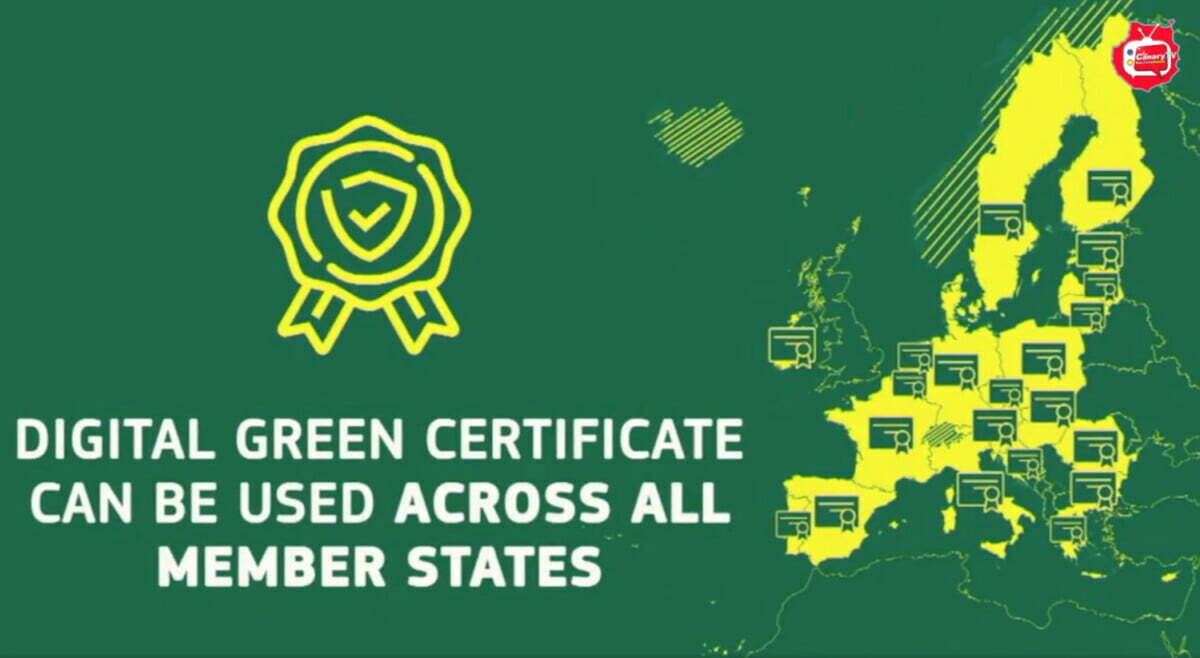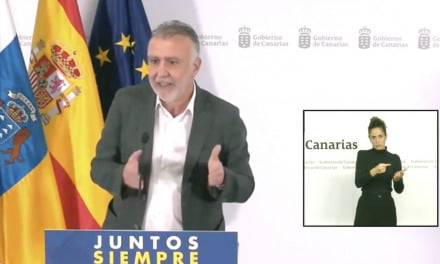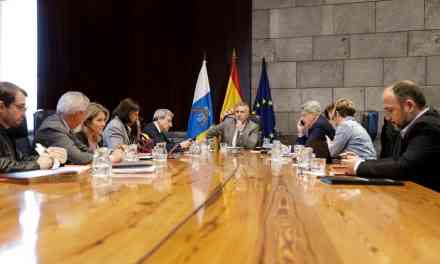On Wednesday the European Commission laid out their proposals for the new Digital Green Certificate to facilitate safe freedom of movement inside the EU during the COVID-19 pandemic. The Digital Green Certificate will be used to prove whether or not a person has been vaccinated against COVID-19, if they have received a negative test result or recovered from COVID-19. It will be available, free of charge, in both digital or paper formats. It will include a QR code to ensure security and authenticity of the certificate. The Commission plans to build an EU-wide digital gateway to ensure all certificates can be verified, and support Member States in the technical implementation of certificates. Member States will remain responsible for deciding which public health restrictions can be waived for travellers but will have to apply any such waivers in the same way to travellers holding a Digital Green Certificate. The proposals were first announced at the end of February, however The Canary Islands were the first to trial a so-called Health Passport, last summer, with UNWTO, and have been calling for similar measures since the start of the pandemic more than a year ago.
 Vice-President for Values and Transparency, Věra Jourová said:
Vice-President for Values and Transparency, Věra Jourová said:
“The Digital Green Certificate offers an EU-wide solution to ensure that EU citizens benefit from a harmonised digital tool to support free movement in the EU. This is a good message in support of recovery. Our key objectives are to offer an easy to use, non-discriminatory and secure tool that fully respects data protection. And we continue working towards international convergence with other partners.”
Commissioner for Justice, Didier Reynders, said:
“With the Digital Green Certificate, we are taking a European approach to ensure EU citizens and their family members can travel safely and with minimum restrictions this summer. The Digital Green Certificate will not be a pre-condition to free movement and it will not discriminate in any way. A common EU-approach will not only help us to gradually restore free movement within the EU and avoid fragmentation. It is also a chance to influence global standards and lead by example based on our European values like data protection.”
On Wednesday March 17 the European Commission outlined plans for the new EU Digital Green Certificate, it is hoped it will be in place before June.
It remains to be seen what similar proposals the UK may wish to put forward to help restart international travel and tourism.
Posted by TheCanary.TV on Thursday, March 18, 2021
It is hoped that this free, bilingual, interoperable and digital certificate will help boost a restart to tourism for the summer allowing travellers to move between countries avoiding some of the restrictions currently in place. The European Parliament and each of the EU countries must first approve the proposal, among which there are some including France or Belgium who have expressed their reluctance to move too quickly as the vaccination rate is lower than expected and there are concerns about discrimination. For now, the President of the Spanish Government, Pedro Sánchez, yesterday, expressed Spain’s support for the certificate proposals.
“It will benefit us and we can aspire to a summer with some tourist activity” Yaiza Castilla – Canary Islands Regional Minister for Tourism
The Canary Islands have expressed some doubts as to whether the benefits will be greater than the costs. Health experts have suggested that it could be a “hasty” measure as not enough vaccine doses have yet been provided and because many aspects of the protection afforded by the various vaccines are still unknown. Several have also raised concerns that this initiative may generate a series of ethical problems as it could cause greater discrimination regarding who can and who cannot travel.
“The vaccine prevents the development of the disease, but not the infection” Amós García Rojas – Epidemiologist
 The electronic certificate will carry health data about the holder with a QR code with which to verify its authenticity, validity and the integrity of the certificate. It will be available in the official language of each country that issues it, and in English. It is not currently planned for use by British citizens travelling to or from the UK.
The electronic certificate will carry health data about the holder with a QR code with which to verify its authenticity, validity and the integrity of the certificate. It will be available in the official language of each country that issues it, and in English. It is not currently planned for use by British citizens travelling to or from the UK.
“We want to help the Member States to restore freedom of movement in a reliable way,” said EC President, Ursula Von der Leyen, on Wednesday during the presentation of the initiative. To which the Commissioner of Justice, Didier Reynder added that Brussels hopes that the document is ready “before the summer, perhaps in June”.
“The homogenisation of clear measures is what has been lacking from the first phase” Juan Pablo González – Ashotel
Canary Islands Regional Minister for Tourism, Yaiza Castilla, said it is a “very positive, complementary measure” that once implemented “will help regain confidence in mobility and vacation travel.” The Minister welcomed the “show of unity” behind this joint decision of the European Union. Because the lack of common criteria within member states has been one of the biggest stumbling blocks to the European tourism sector so far.
“The homogenisation of clear measures is what has been lacking since the first phase,” commented Juan Pablo González of Ashotel, who expressed positivity that, for the first time since the pandemic began, a single criterion has been established for European travellers.
José María Mañaricúa, president of the Las Palmas Hospitality and Tourism Federation (FEHT), said the covid passport is a good initiative “as long as it is taken as a joint decision”.
“It will be useful when most of the population is vaccinated” Rodrigo Martín – President of the COMTF
 While Spain has expressed willingness to support this European initiative, Minister of Tourism, Reyes Maroto, stated a few days ago that Spain could start using the certificate in May –just in time for the rescheduled International Tourism Fair FITUR. However France and Belgium have expressed reluctance due to what they see as the possibility of discrimination against people who have not been vaccinated, taking into account that the vaccination rate is currently lower than had been hoped for.
While Spain has expressed willingness to support this European initiative, Minister of Tourism, Reyes Maroto, stated a few days ago that Spain could start using the certificate in May –just in time for the rescheduled International Tourism Fair FITUR. However France and Belgium have expressed reluctance due to what they see as the possibility of discrimination against people who have not been vaccinated, taking into account that the vaccination rate is currently lower than had been hoped for.
Roberto Ucelay, president of the Circle of Entrepreneurs and Professionals of the South of Tenerife (CEST) points out the maxim of this initiative is “to guarantee better control of travellers”, and estimates that this is one of the the most useful features of the new certificate, but is very critical of the border management currently carried out by the Canary Islands government, saying that “there are people who are not even checked if they are travelling with the test done, despite it being mandatory.” In his opinion the digitisation of these types of data is an important part of the European initiative.
The Canary Islands government has called for prudence. “This passport is not a pass that totally frees us from risks, it is only a tool with which, it is intended, to indicate that the risks of contagion have been minimised,” says Yaiza Castilla, “we must live with other protection measures at least until the the pandemic can be overcome and not lower our guard”. There are doubts about factors such as “the temporal scope of the immunity of vaccines or their behaviour against new strains.” At the moment, the certificate does not have a specific validity period, it will depend on subsequent scientific evidence.
Despite the doubts and reluctance expressed about this new initiative, what is clear from the Canary Islands is that “without a doubt it will benefit us”, Castilla points out, expressing hope that the Archipelago can enjoy a summer “with some tourist activity” that lays the foundations for a more solid recovery in 2022 starting from the high season, beginning in November 2021.
Spanish doctors have asked for support to be withdrawn for the Digital Green Certificate
The Spanish Society of Public Health and Health Administration (SESPAS) yesterday asked the Spanish government not to support the implementation of the vaccination certificate because there is no scientific evidence on the transmissibility of people who have been vaccinated, it would be discriminatory because there is not yet universal access to vaccines and it violates health data privacy.
SESPAS pointed out that “the usefulness of the vaccine in reducing transmission is not yet entirely clear and, in any case, it could be limited” saying “it cannot be ruled out that a vaccinated person can transmit the virus”.
“This may pose a significant risk to the appearance of new variants”, which could be more transmissible. The effectiveness of vaccines has already been shown in some trials to be lower against emerging variants. “The use of the certificate with the belief that the vaccinated person will not get sick and will not transmit the virus could be a public health problem of the first order. The certificate may have a great impact due to the transmission dynamics of SARS-CoV-2 and this could contribute to generating new pandemic waves ”, the society warned in a statement. They also pointed out that “the duration of the immunity conferred by vaccination is still unknown, so a certificate of this type may only be temporary.” | Efe
“The digital green certificate will not be a precondition for free movement and in no case will it be discriminatory,” said Justice Commissioner Didier Reynders, to emphasise that the Community Executive has listened to the reservations of countries such as France and Belgium, who warn that they will not accept a “covid passport”
If the certificate goes ahead, which still has to be negotiated with the Council and the European Parliament, the Commission also asks that it be a “temporary” measure that is suspended at the time the World Health Organisation declares the end of the international health emergency.
This initiative is open to countries within the European Economic Area – Iceland, Liechtenstein, Norway and Switzerland – on the condition of reciprocity and the Commission is working with third countries to also seek convergence with international systems.
Key elements of the regulation proposed by the Commission:
- Accessible and secure certificates for all EU citizens:
- The Digital Green Certificate will cover three types of certificates –vaccination certificates, test certificates (NAAT/RT-PCR test or a rapid antigen test), and certificates for persons who have recovered from COVID-19.
- The certificates will be issued in a digital form or on paper. Both will have a QR code that contains necessary key information as well as a digital signature to make sure the certificate is authentic.
- The Commission will build a gateway and support Member States to develop software that authorities can use to verify all certificate signatures across the EU. No personal data of the certificate holders passes through the gateway, or is retained by the verifying Member State.
- The certificates will be available free of charge and in the official language or languages of the issuing Member State and English.
- Non-discrimination:
- All people – vaccinated and non-vaccinated – should benefit from a Digital Green Certificate when travelling in the EU. To prevent discrimination against individuals who are not vaccinated, the Commission proposes to create not only an interoperable vaccination certificate, but also COVID-19 test certificates and certificates for persons who have recovered from COVID-19.
- Same right for travellers with the Digital Green Certificate –where Member States accept proof of vaccination to waive certain public health restrictions such as testing or quarantine, they would be required to accept, under the same conditions, vaccination certificates issued under the Digital Green Certificate system. This obligation would be limited to vaccines that have received EU-wide marketing authorisation, but Member States can decide to accept other vaccines in addition.
- Notification of other measures – if a Member State continues to require holders of a Digital Green Certificate to quarantine or test, it must notify the Commission and all other Member States and explain the reasons for such measures.
- Only essential information and secure personal data:
- The certificates will include a limited set of information such as name, date of birth, date of issuance, relevant information about vaccine/test/recovery and a unique identifier of the certificate. This data can be checked only to confirm and verify the authenticity and validity of certificates.
The Digital Green Certificate will be valid in all EU Member States and open for Iceland, Liechtenstein, Norway as well as Switzerland. The Digital Green Certificate should be issued to EU citizens and their family members, regardless of their nationality. It should also be issued to non-EU nationals who reside in the EU and to visitors who have the right to travel to other Member States.
The Digital Green Certificate system is a temporary measure. It will be suspended once the World Health Organisation (WHO) declares the end of the COVID-19 international health emergency.
Next Steps
To be ready before the summer, this proposal needs a swift adoption by the European Parliament and the Council.
In parallel, Member States must implement the trust framework and technical standards, agreed in the eHealth network, to ensure timely implementation of the Digital Green Certificate, their interoperability and full compliance with personal data protection. The aim is to have the technical work and the proposal completed in the coming months.
Background
To comply with the measures to limit the spread of the coronavirus, travellers in the EU have been asked to provide various documents, such as medical certificates, test results, or declarations. The absence of standardised formats has resulted in travellers experiencing problems when moving within the EU. There have also been reports of fraudulent or forged documents.
In their statement adopted following the informal video conferences on 25 and 26 February 2021, the members of the European Council called for work to continue on a common approach to vaccination certificates. The Commission has been working with the Member States in the eHealth Network, a voluntary network connecting national authorities responsible for eHealth, on preparing the interoperability of vaccination certificates. Guidelines were adopted on 27 January and updated on 12 March, and the trust framework outline was agreed on 12 March 2021.
On Wednesday the Commission adopted a legislative proposal establishing a common framework for a Digital Green Certificate. The Commission also adopted a complementary proposal to ensure that the Digital Green Certificate is also issued to non-EU nationals who reside in Member States or Schengen Associated States and to visitors who have the right to travel to other Member States. Separate proposals to cover citizens and non-EU citizens are necessary for legal reasons; there is no difference in treatment of citizens and eligible non-EU citizens for the purpose of the certificates.
The latest information on coronavirus measures as well as travel restrictions provided to us by Member States are available on the Re-open EU platform.













